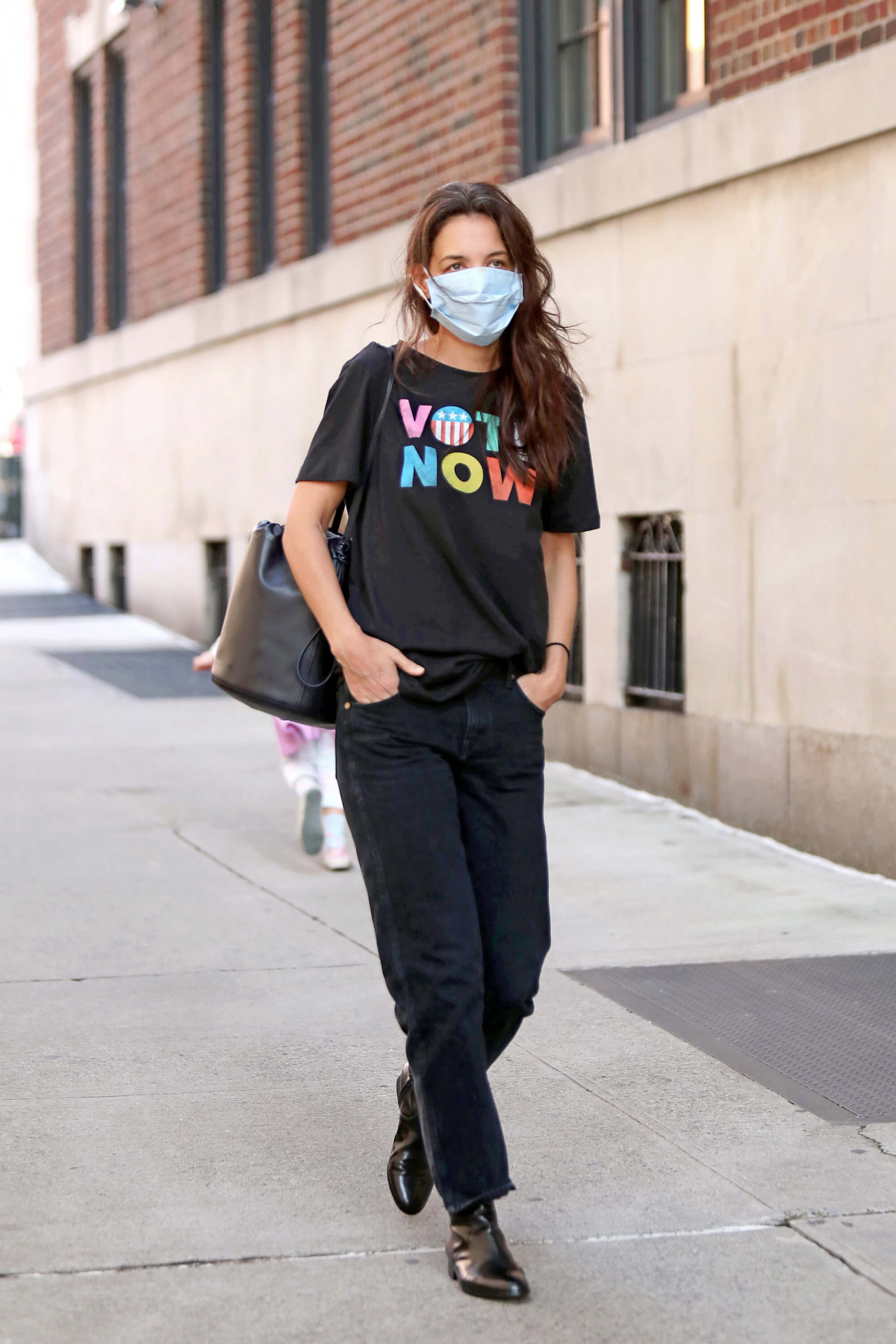Responding to the concerns of Gen Z, American fashion brands are engaging with politics. But will this alienate shoppers?
This time round, fashion wants to play its part. The high stakes of a fiercely fought US presidential election, to be held on 3 November, are prompting fashion labels and retailers to cast aside their usual political reticence, responding both to employees and to consumers who expect brands to get involved.
New get-out-the-vote platforms are winning support from apparel companies that run the gamut from luxury to direct-to-consumer. Saks Fifth Avenue is registering voters at its New York flagship and online at Saks.com. Warby Parker and Tory Burch are paying employees to volunteer at polls. Ralph Lauren has declared Election Day a company-wide holiday. Patagonia even sewed a crudely worded voting appeal into the waistbands of shorts.
.jpg)
Only 56 per cent of the voting age population cast a ballot in the 2016 US presidential election, which is low compared to most nations, according to Pew Research Center. But a vocal and growing cohort of young fashion consumers from Hong Kong to Chicago, who gravitate towards brands that share the same values, expect companies to take ethical stands.
Gen Z, the youngest generation of consumers, is growing in influence, having this year surpassed millennials as the largest generation on earth. These youthful shoppers’ opinions and the factors that drive their spending make them a growing economic force on every continent. And the issues that are of concern to them — including environment and climate change, all-gender parity and racial and LGBTQ+ equity — are driving the US election.
Political engagement brings with it risks for brands. Savvy customers are quick to sniff out inauthentic or pandering messages. But non-engagement, likewise, brings risks too. Fashion business consultant Robert Burke says the shift in attitude is being driven by social media and the direct communications it drives between brands and consumers. “It was not long ago when brands and designers would absolutely not comment on anything about [politics] because they were so afraid of alienating customers,” Burke says. By contrast, brands now fear they may be accused of complacency if they do not speak out. “They run the risk of Diet Prada or someone calling them out if they don’t say something,” Burke adds.
Gap Inc., one of America’s largest retailers with $16.4 billion in revenue in 2019 and 129,000 employees in February 2020, is directing employees to resources to educate themselves on candidates and issues. The company has dubbed its broad efforts #GapIncVotes and includes all of its brands: Intermix, Athleta, Banana Republic and Old Navy. Plans have been tailored for each brand’s ethos, and include an election day Instagram concert with pop star JoJo. Old Navy will pay store employees who work as poll workers for eight hours. GapKids has formed a “Be the Future” collective with several young climate activists that is billed as a call to action “for youth, led by youth”.
Gap’s more active involvement in elections began during the 2018 midterms in response to employee questions about voting, says Gabrielle Friedman, Gap’s senior manager of government affairs in Washington DC. It has picked up substantially since. “When Gap Inc. started down this journey, we went from, let’s see if they’re interested to, wow, they’re really interested!” Friedman says. “And we felt our customer would expect us to talk about it.” The company has formed an employee “Team Democracy” that earns badges by studying ballots and researching candidates and issues. Store managers receive collateral to help discuss voting with their teams, who are encouraged to talk about it with customers.
Apparel companies are finding that when political action authentically aligns with a brand’s values, it strengthens the relationship with customers and employees alike. “What we have found as a company is that when we do the right thing, we sell more,” says JJ Huggins, a spokesman for Patagonia, which has long championed sustainability. “It improves our brand image.”
Earlier this month, Patagonia produced shorts with a hidden message — an interior label that read “Vote the assholes out”. The $79 “regenerative stand-up shorts” went viral and quickly sold out. Huggins says the message is not aimed at any specific individuals but rather at climate-change deniers.
Despite efforts to remain non-partisan, there is always the potential of blowback. Department store retailer Nordstrom this autumn promoted National Black Voter day on 18 September and has launched a get-out-the-vote campaign, called Make Your Voice Heard, that involves an alliance with nonprofits National Urban League and When We All Vote. However some social media commenters criticised the Seattle-based retailer, requesting that a retailer should stay mum — “Stop being political! You’re a retail store. Get out of politics! Geez!!” posted one commenter.
Nordstrom defends its stance. “For us, this is a non-partisan initiative. Our hope is to inspire more people of all backgrounds to participate in the process, regardless of who they choose to vote for,” says Pamela Lopez, a Nordstrom spokeswoman.
Patagonia is behind a broad corporate consortium called Time To Vote. It began as a company initiative in 2016, when the retailer chose to close its stores, offices and distribution centres on the November election day, giving all employees a paid day off so they would have plenty of time to vote.
“Shopping could wait a day,” says Huggins, who was a store manager in Santa Monica at the time. Buoyed by the positive response, in 2018 Patagonia co-founded the voter awareness initiative, working with Levi Strauss and PayPal. They asked company executives to pledge to support their employees in voting. “We thought we might get a couple of dozen companies. We got 411,” Huggins says.
Pledges to the consortium snowballed after the killing of George Floyd in May 2020 as people began to connect the dots between racial justice and voting. Companies have been joining at a rate of more than 10 per day, with roughly 1,300 members who thus far have taken a pledge to give employees time they need to cast ballots. The many fashion members include Tiffany & Co., L’Oréal USA, Loro Piana, Diane von Furstenberg and Nike, but they also span industries from finance to tech and sports, including Morgan Stanley, Sonos and Major League Baseball.
Time to Vote doesn’t dictate an approach. Many members offer a few hours of paid time off while others are shutting down operations for the day and offering forms of voter assistance such as research resources.
None of the companies Vogue Business spoke with found the expenses of their get-out-the-vote initiatives to be worrisome — or even worth tracking. “There certainly is a cost. We would say it’s worth it,” says Gap’s Friedman.
The push to support employees with voting shows signs of being a long-term shift in the US even outside of fashion. There is increasing support for bills introduced in Congress to make election day a national holiday — as it was for much of the 19th century when US voter participation peaked at 80 per cent or more.
After deciding to make the day a paid holiday and close its corporate offices, Ralph Lauren last week opted in addition to close its Greensboro, NC distribution centres on election day. Any employees who must work will receive holiday pay as well as time off to vote.
Spokeswoman Katie Ioanilli says there has been no push-back. “We believe civic engagement matters and want to ensure our team members have the time off and the resources they need to vote — especially when Covid adds complexity to exercising this right,” she says.
Meanwhile, Patagonia spokesman JJ Huggins has found himself an additional task, working on the communications team for Time To Vote. Like many of his fellow employees, he’s very happy to take it on. “It’s not election day, it’s election season,” he says.

